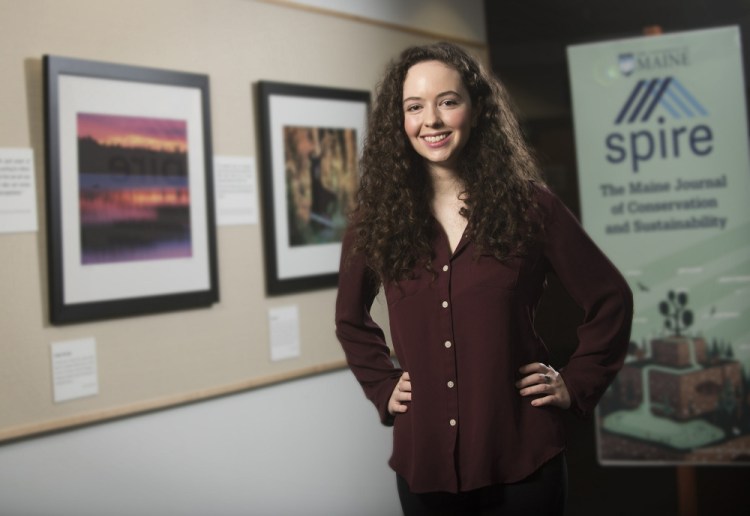In December of her first year as a graduate student at the University of Maine, Kaitlyn Abrams went to the chair of her English department and asked whether the university had any environmental journals. “She said, ‘No, but maybe you should start one,’ ” Abrams said. Which is exactly what Abrams did, with help from faculty and other students. The journal, called Spire, debuted online last week. We called Abrams to talk about Spire and learned a few things about how her path from fiction diverged and what it was like to start a journal from scratch. We also found out about her next move, which involves, of all things, lions.
EVERGREEN STATE: Abrams is a native of Kent, Washington, a Seattle suburb. How did she find her way to Maine? “The siren song of full funding,” she said. She’d graduated from Western Washington University and was up for going far, far away to graduate school. In addition to working on her masters, she teaches English 101. “That is how I put bread on the table.”
FILLING A VOID: It’s hard to believe a university that is home to both the Institute for Climate Change and the Senator George J. Mitchell Center for Sustainability Solutions, not to mention a cafeteria run on hard-core sustainability values, did not have a journal devoted to sustainability prior to this. “I experienced the same bafflement,” Abrams said. She met with Dan Dixon, who is a professor as well as director of the university’s Office of Sustainability. He liked the idea of a journal, agreed to serve as the faculty adviser and directed Abrams to come up with a name, a mission and a concept.
MAINE MISSION: One core concept was inclusivity, encompassing people from all departments at the university and beyond. “We definitely stressed that it should be interdisciplinary, because one of the challenges we discussed was, ‘How do we get people involved, how do we get them thinking they have a stake in sustainability?’ ” They sought out potential advisory board members, put together a proposal to the provost to make it official and then focused on getting the word out. What about that name? “It’s not like a funny story,” she said. “I wanted a simple, memorable word or turn of phrase that was emblematic of high places, a peak to strive for.”
JUMPING BARRIERS: Abrams says she herself is a prime example of the interdisciplinary energy they’re trying to create. “For instance, your assumption was that I was in the Climate Change Institute.” (Guilty). Regardless of department or area of expertise (nursing, art, literature) everyone should feel part of the overarching discussion about sustainability and the environment. The first issue features submissions from many departments, including biology and ecology, graphic design, photography, nursing and forest resources, among others. Works from Lee Ann and Thomas Mark Szelog’s photo documentation of the proposed Maine Woods National Park are included, and the school’s Hudson Museum is showcasing that project in an exhibit (through June 30) that coincides with Spire’s release.
OUT OF SOUTH AFRICA: At this triumphant moment, Abrams is preparing to say goodbye to the journal she created (and which served as her thesis project). She’ll be moving to England to attend Oxford. And not to study English. A funny thing happened on the way through her master’s program; she decided to get a master’s in science, focusing on nature and society and environmental governance. With an emphasis on environmental policy. If there’s funding, she’ll stay for a doctorate. “I have this dissertation topic already that I stumbled on.” It’s about the odd and awful practice of lion tourism in Africa, where tourists can pay to cuddle with lion cubs. “It is adorable, but what they don’t know is that those lions were bred in essentially a puppy mill for human entertainment. Then they will be sold to a hunt reserve where they will eventually be shot in an enclosure.” (For another kind of tourism.) Abrams will be studying how shifting legislation in the United Kingdom could help end the practice.
THE FUTURE OF SPIRE: She hopes to leave Spire in good shape for its next issue. The student-run editorial staff was able to publish about half the submissions received, she said. Now they are looking for more, from scholars and community members who have articles, essays, data, artwork, photography or poetry “with an environmental, conservation or sustainability theme.” (Visit umaine.edu/spire/submit for more information on how to submit). Abrams wants the submissions to be far-ranging in topics but relatable to a broader audience. “One thing I was looking for, as the general editor, is how can we bring this back to our Maine constituency?” The first issue includes a piece on climate change in Syria – her task there as editor was to make sure the relevance beyond Syria was clear – and one by UMaine professor and bee expert Frances (Frank) Drummond about wildflowers, bees and the cultivation of honey. Of this piece, Abrams says, “We were blown away.” None of the contributors get paid. Nor does the journal cost anything. It’s web-only, making it a greener read about being green.
Mary Pols can be contacted at 791-6456 or at:
Twitter: MaryPols
Send questions/comments to the editors.




Comments are no longer available on this story